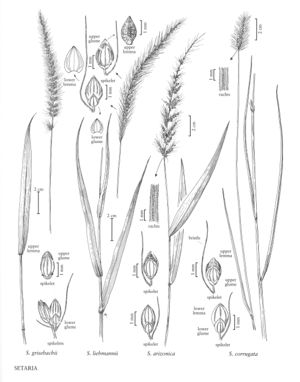Difference between revisions of "Setaria liebmannii"
FNA>Volume Importer |
imported>Volume Importer |
||
| (7 intermediate revisions by 2 users not shown) | |||
| Line 26: | Line 26: | ||
-->{{#Taxon: | -->{{#Taxon: | ||
name=Setaria liebmannii | name=Setaria liebmannii | ||
| − | |||
|authority=E. Fourn. | |authority=E. Fourn. | ||
|rank=species | |rank=species | ||
| Line 33: | Line 32: | ||
|basionyms= | |basionyms= | ||
|family=Poaceae | |family=Poaceae | ||
| + | |illustrator=Linda A. Vorobik;Annaliese Miller | ||
| + | |illustration copyright=Utah State University | ||
|distribution=Ariz. | |distribution=Ariz. | ||
|reference=None | |reference=None | ||
| Line 38: | Line 39: | ||
|publication year= | |publication year= | ||
|special status= | |special status= | ||
| − | |source xml=https:// | + | |source xml=https://bitbucket.org/aafc-mbb/fna-data-curation/src/200273ad09963decb8fc72550212de541d86569d/coarse_grained_fna_xml/V25/V25_1411.xml |
|subfamily=Poaceae subfam. Panicoideae | |subfamily=Poaceae subfam. Panicoideae | ||
|tribe=Poaceae tribe Paniceae | |tribe=Poaceae tribe Paniceae | ||
Latest revision as of 18:56, 11 May 2021
Plants annual. Culms 30-90 cm. Sheaths glabrous, margins ciliate; ligules ciliate; blades to 20 cm long, 10-20 mm wide, flat, scabrous on both surfaces. Panicles 10-25 cm, loosely spicate; rachises scabrous; bristles solitary, 7-15 mm, slender, antrorsely scabrous. Spikelets 2-2.7(3) mm. Lower glumes about 1/3 as long as the spikelets, 3-veined; upper glumes and lower lemmas 7-veined, the 5 central veins coalescing at the apices; lower paleas absent; upper lemmas gibbous, strongly and coarsely transversely rugose; upper paleas similar to the upper lemmas. 2n = 18.
Discussion
Within the Flora region, Setaria liebmannii is known only from southern Arizona, but it is a common species along the Pacific slope from northern Mexico to Nicaragua, usually growing at elevations below 750 m. The five apically coalescing veins and the additional free pair at the periphery are unique among the Setaria species in the Flora region.
Selected References
None.
